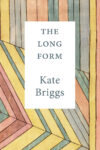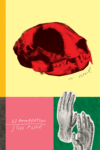
Photo credit: Lydia White
I met up with Tony Tulathimutte on a Sunday afternoon in March to talk about his first novel, Private Citizens, after having spent the prior week reading it greedily. I neglected household chores. On more than one occasion I was late to work. I had to ignore several unsteady old ladies standing on the bus. They glowered at me for hogging a seat, but my nose stayed deep in the book.
Four Stanford grads navigate the perils of 21st century San Francisco: It’s not a story I had expected to love, but I did love it. It’s a hilarious, harrowing probe of self-concept that denudes human contradictions as well as one of its characters, literally, on a crowded bus, in front of a girl he had been righteously (creepily) defending. How could you not love a serious novel that doesn’t take itself seriously?
Tulathimutte suggested we go to quiet bar on an out-of-the-way street on the edge of Brooklyn, right before it shades into Queens. Our conversation ranged from writing habits to writing classes, from Philip Roth to Fuller House, from masturbation to cognitive psychology. His answers to my questions managed to be detailed and precise, but also witty and fleet-footed. If your ego’s in need of deflating, record a conversation with Tony Tulathimutte and compare his eloquent explications to your own stuttering prattle. (Oh, by the way, this interview has been edited for clarity and concision.)
This is Part 2 of the interview. Part 1 can be found here.
Kevin Zambrano: The novel starts off very disconnected, like intertwined short stories, but as it goes on it starts to unify, and the characters come closer and closer together. Was this structure immediately apparent?
Tony Tulathimutte: The way the book turned out is a reflection of my confusion while writing it. I wrote all of the book pretty much at the same time. This came in the form of like, Here’s a sentence I like, I have no idea where it’s going to go yet. Here’s another. Here’s a character I just thought of. I don’t know what the character does in the story… And over seven and a half years, it kind of coalesced like a nebula into scenes, and the characters were well-defined enough to know what to assign to them.
The story diverges in form but converges in content. So you start with four characters in a car together, you get introduced to each one, and after that it’s very tidy. Four chapters with characters by themselves, four more chapters with two characters apiece, with other characters appearing. Each chapter is a triptych. The last four chapters involve every character. So formally it ends up branching out by powers of two. On a content level, they begin far apart, and come together.
That was not at all by design for several years. I was just wringing the sweat out of my t-shirt about how I was going to make it all come together. There are tons of points in the book where I’m just like, “Fuck it, time to do plot,” something pretty improbable will happen, and I’ll assume the reader is sophisticated enough to recognize a plot device, as both Lorentzen and Sarah Nicole Prickett did. One part explicitly acknowledges this, the section called “A Vehicle,” where the person who’s hit by a car calls it a deus ex machina.
She doesn’t completely remember, but she’s thinking like, Ye olde conceit, out nowhere, the will of a desperate author ramming aside the real, just to advance someone’s cheap tidy idea of the world. This is exactly of course what it does in the book. Or when Henrik thinks about how the variable terms used in a formulation of determinism spell out P-L-O-T. These are all nods and winks at the audience. “I know what I’m doing. You know what I’m doing.”
“This is fiction, everyone…”
“Let’s make a joke about it and move on.” If they can do it in the first episode of Fuller House, then I can. It’s not exactly avant-garde.
If you can get as close to the opposite of avant-garde as possible, it might be Fuller House.
It’s like, après-garde.
You mentioned that Private Citizens took seven and a half years to write. I can’t imagine a lot of people reading this will have spent so long working on a single project, and then had that project be so in the public sphere. I’m curious… even just for my own sake. I don’t know what that feels like. How does it feel?
It’s not out of the ordinary among writers. Alex Chee just put out a book that took twelve years.
For sure. Seven and a half years is not an unusually long time to write a novel.
But it’s a long fucking time to work on anything. At my book launch, my sister came from out of town, and I’m like, “To anybody who thinks what I did is a really great accomplishment, my sister is here tonight, and in the time it took me to finish this book, she became a doctor, got married, had three kids, and beat cancer.” I’m not even kidding. Her husband’s a doctor too. So she covered all the bases with my parents, and I wrote one book that’s a paperback original.
But I’m inordinately proud of it. And inordinately defensive. It’s easy to let your ego get away from you when something’s unquestionably the most important thing to you. Then when you get capsule reviews, and people dismissing it as yet another entry in some genre, you never feel like you got a fair read, equivalent to the amount of thought and effort you put into it. But nobody’s going to write a book review for seven and a half years. Also you might be deluding yourself. Donald Trump thinks he’s doing great things.
He sells hats that say he’s doing a great thing.
You have to keep your ego on a short leash. But it does really hurt to work on something for a long time, to be engaged in the conversation around books and know what gets praised and panned and why, and then to come out with a book and have it slept on by every major newspaper. It’s a disappointment.
That is not to say I think the book is doing particularly poorly. I’m enormously grateful for the Bookforum and New York Magazine reviews, because those two reviewers got it. I’m not living in a cork-lined garret coughing TB blood into a handkerchief and, like, turning to Nietzsche. But it is tough to know that there’s so much mediocrity out there supported and enabled by unfair power structures.
It’s hard to have the long view, that a book’s life is longer than a few months or a year, or five years…
You count on it being immortal.
Before Private Citizens, you wrote short stories. What were the difficulties of writing a novel compared to a story?
More than anything, I drew on a completely different set of aesthetic principles and a different period of my life. It took me a long time to figure out how to write about 20-somethings instead of teenagers, the stuff I cared about when I was an undergrad. You need time to digest yourself. But I’ll defend the craft of those stories. For short stories that take 20 minutes to read, so much effort goes into making every part work.
You won an O. Henry, like, right out the gate.
My first published story, yeah.
That’s a big fucking deal.
Yeah and it also completely scrambles up your idea…
Like, “I’m going to win the Nobel by 40.”
It’s sort of dangerous to overpraise young people. There’s two bad outcomes. One is that you could keep on ascending and have no idea how bad it is for other talented people working in different things for different reasons, either because of discrimination or because they just didn’t get their manuscript under the right noses.
Or you can be like me, and get a ton of praise early on, then none for like another decade, and feel like a has-been the entire time. This is part of the feeling that Linda describes when she becomes discouraged about her own writing. “By the time any of this gets published, I’ll be 30, and then what’s the point?” Any art is a sacrifice. Such an investment. So much time spent alone. So little praise. It’s not legitimized as a profession. Money is scarce. It’s not something that even if you’re immensely successful most people will be aware of.
You can count on your hand the novelists who make a living solely with their novels. Stephen King…Jonathan Franzen…
It depends on what you mean by “making a living on your novels” though, because there’s teaching. I’m not going to get into the MFA vs NYC thing.
You wrote an article about that. You have an MFA and you live in NYC.
Which is why it’s a false fucking dichotomy.
I feel like every writer I know in New York has an MFA.
And if you have an MFA, and you publish a book, you’re going to be published in NYC. If you live in NYC, but you need some time to write, you’re probably going to take an MFA.
Anyway, this yearning for notoriety and approval does nothing for your self-worth. It gets you in a slightly better place professionally, but it’s not going to scratch whatever itch the writing itself was meant to address. This is why people are insecure about it. Fiction right now is so culturally marginal, if you’re not going to be this huge world-historical success, why throw your life at it? Why not get out and do something else that’s going to make you happy now? Why not cultivate a garden? Join a bar band? But unfortunately it’s not really your choice if your problems are going to be addressed by writing. Easy stuff isn’t satisfying.
How would you describe those early stories?
I wrote about these young, sensitive, mostly female, white protagonists who were usually way worse off than me. They were usually poorer, usually more in thrall to their flaws or misguided, but I, as the gentle, benevolent writer, would lead them through a tragic situation and have them come through with grace and redemption. This is something that’s encouraged for the reasons we talked about earlier, because having morally nutritious content is considered worthier than talking about hipsters and blowjobs.
This is also why tragedy and drama are considered higher art than comedy. This is what I was hung up on…I will actually say it was partially encouraged in school. Because creative writing programs try to get you to care about fiction by any means necessary, and one way is by saying that it’s a way of bridging the gap between you and other people and making you feel less lonely. When they should be like, “Yo, you should get in on this, it’s super fucking fun.”
Why white women?
Partly because of the environment I grew up in. I grew up in Western Mass, one of the only Asian kids, and I had like two friends until seventh grade. And then I went to a private school that had just recently gone co-ed. So I was one of five guys in my graduating class. It was a grade 6-12 program. Our mascot was the unicorn. Not kidding. I was the unicorn one year. We didn’t have a football team, but we did have a mascot for our literary magazine. I wore the bowler hat from The Unbearable Lightness of Being with a lollipop horn sticking out of it. Go Unicorns.
So you were writing that far back?
No, I was doing it as a favor to friends who worked for the literary magazine. I didn’t give a single thought to writing until I was in college. Or the summer before college, actually.
What prompted that?
I had a charismatic friend who was really literary-minded and passionate about writing. As with many other things, I ended up following her lead. So I thought it was a cool thing to do. That’s what kept me in the game, I thought it was cool. I got The Corrections for my 18th birthday, which is the day it came out. Sept 1, 2001, ten days before 9/11. Then I go to college and study with Adam Johnson, who’s won every prize under the sun now, but back then he was a Stegner Fellow, and also immensely charismatic. So me and a cohort of other writers took his intro class, and we’ve been friends for almost 15 years now, and still writing. Jenny Zhang just sold her book. Alice Sola Kim. Karan Mahajan, whose book is coming out next month. Anthony Ha, Anna North, Vauhini Vara, Esmé Wang.
But you didn’t study writing. You studied Symbolic Systems, which I thought sounded like semiotics, but it’s more like cognitive science.
Anywhere else it would be called “Cognitive Science,” but at Stanford they add some humanities classes. Linguistics, psychology, philosophy, formal logic, computer science, and when you get deeper into it stuff like cellular automata, artificial intelligence. I concentrated in human-computer interaction.
Did that inform your writing?
Of course. Not least because I worked in Silicon Valley for four years as a tech consultant. This is where most of Will’s plotline comes from, being immersed in that culture.
There are a handful of insights where a cognitive psychology degree becomes useful in understanding consciousness. For example, when writing from a limited perspective, it affects how you do description. Cognitive psychology gives you a clear idea about attention, about how many things a human can hold in their head at the same time, the modularity of consciousness, what they’ll pay attention to in a visual space, how much auditory information they can process, and what kind. There’s something in cog psych called the “cocktail party effect.” At a cocktail party people are talking all around you, but you’re focused on the person you’re talking to, so it all gets drowned out until someone says your name, and you’re like “Huh? What was that?” This is used to illustrate cognitive preprocessing, the fact that before your conscious awareness, your brain is doing a lot of filtering and organizing to present what you experience as your actual subjective consciousness. If it decides something’s relevant, then it passes it on to your conscious thought. Other stuff it weeds out. Depending on mood, the chemicals in your body, the range of that stuff could change.
It gives you a good grasp of how to approach description. A lot of novices would describe a room by maybe describing three things in it. But they’ll be these totally arbitrary details that would not be at all attached to the character’s perspective. In close perspective, all detail is attached to the character’s mind, so it’s really important to have an understanding of what people would plausibly be focused on.
This is an entirely different form of relevance. People will be able to hear their own name in a stream of chatter, or the English language in a stream of babble.
I mentioned earlier that your book has a lot of description, and yeah, it’s all filled through perception, through minds. Free-indirect style. Presenting the world and your characters…
…and trying to forge some kind of unity between them. Making a description of a scene also be a reflection of somebody’s psyche and vice versa. Usually what I’m talking about is the idea of mood. The idea that your circumstances, how much you’ve slept, how much you’ve had to drink, what time of day it is, other mysterious inputs—these have a huge effect on the way that you perceive the world around you as being essentially forgiving or antagonistic. One example from my book is when Cory’s at the Handshake seminar. “Cory looked out at the milling throng. The thrilling mong.” It’s just like this pointless wordplay, but, to me, this is something that my mind does if I’m kind of tired, I’m just like Oh man, what a milling throng out there. And then my brain does an extra spin on it… it doesn’t mean anything. I’m just trying to come up with a joke, but it ends up being some bizarre whatever-it-is.
Back to your pre-writing career. You worked in tech for four years?
Four years. Yes.
Was writing the endgame all along?
Especially in a culture that doesn’t encourage writing, you get a lot of lip service to following your passions and dreams, but most people, especially your parents, will delimit this kind of advice by saying, “Hey, you also gotta eat.” You never know, especially when you are young, you have no perspective on how realistic or viable it is to chase the dragon.
Majoring in cognitive sciences was partly a concession to the parents who paid my tuition. I don’t have it in me to be like, “No, I’m going to study what I want with your tuition money,” so I picked a very commercially viable major. It was on average the highest-paid major at Stanford. And I went directly into a high-paid job in a Silicon Valley game company. I knew I couldn’t go straight out of school and support myself on short fiction, so instead I made a buttload of money. I was like, “Next best thing: I’ll get rich and write on the side.”
And I didn’t write for two years. I was too caught up in figuring out how to be a self-sufficient adult and get girls to like me and meet new people and avail myself of all these interesting opportunities in the city. My eye went off the ball, even though there was always this gnawing, carnivorous Jiminy Cricket telling me I needed to be a writer. And eventually it became unbearable. I really did feel like, “Oh I’m going to karaoke every week, and I’m not really killing it on OKCupid, so maybe I should go back to the thing that actually fed me in some way, and force myself to write.” Very little writing got done. But I eventually squirted out a novella, and then the beginnings of this book. I applied to Iowa with the prologue and the first chapter.
Tell me more about Iowa.
I loved Iowa. I met some of the most important people in my life there. I felt legitimized as a writer. And I met some of the stupidest people alive. And I received a lot advice that I considered insulting and damaging. There were ups and downs. I can’t say I was any lonelier there than here. But how can you not be grateful to someone who’s paying you to be alive just so you can dick around in letters? I have that kind of filial gratitude toward them.
Also, like, it’s an extremely hermetic culture where you can simultaneously like realize your dreams and mull over the pettiest, gossipiest bullshit in the world. Shit that really doesn’t matter, who fucked whom, which writing teachers are secret drunks, who got funding and what kind—that petty shit. While pondering mortality and eternal wisdom. Of course these hierarchies replicate all across society, but literary society prides itself on self-awareness, an awareness of cliches and tropes. There are people who involve themselves by trying to get in as many sexual entanglements as possible, bringing guns to readings, beginning bonfires that actually touch the tree branches in the backyard. But then another sort is like, “Everybody else is doing this petty bullshit, I’m not, I’m above performing this, I’m a true writer who goes home at 8 pm and writes, I don’t go to any of these writer parties, these poet parties, where everybody’s doing drugs and igniting things.” Even that performance is a participation in the very same.
Again, by dissecting this, as it goes with my book, I’m not trying to hoist myself above any of it or suggest that I didn’t participate myself. I’m just trying to postgame it a bit.
And now you teach.
I teach at Sackett Street and Catapult. I’m applying for full-time gigs now.
Do you like teaching?
I love teaching, yeah.
How does it affect your writing?
It keeps you in touch with the fundamentals. The fact that, yes, you do need to hyphenate compound modifiers. Also helping students avoid conventionality helps you from lapsing back into it. Keeping in mind that you’re there to help people write new and interesting stories and not teacher-approved, likely-to-be-published stories. That and I just like to hear myself talk.
Do you have specific stories you like to cover?
Totally. The one I usually start off with is Raymond Carver’s “One More Thing,” a two-page story that to me is an incredibly useful pedagogical tool for close reading because it’s so clear what he’s doing in every sentence. He never uses big words or fancy rhetorical devices, no weird allusions or extended metaphors. For intro-level writers it’s easy to teach. I make everybody go around and tell me what each sentence is doing in the story and how it’s pushing it forward, either about character, the plot, exposition, whether it’s referring to things earlier in the story, how he’s keeping things concise by alluding to things he never actually specifies.
The second story I always teach is “Spring in Fialta” by Nabokov, my favorite short story. It’s just a way of throwing people into the deep end, showcasing this specific, ostentatious, over-the-top literary vision, the crazy things that shouldn’t work, but do. Hopefully it encourages people to be ambitious.
After that, I teach a perspective class about Flannery O’Connor’s “Good Country People.” It’s a shifting-perspective story whose mechanics are very transparent. I teach Z. Z. Packer’s “Brownies” for swift character exposition. Philip Roth’s “Conversion of the Jews” for dialogue. My friend Carmen Machado wrote a novella called Especially Heinous: 272 Views of Law & Order SVU. It’s based on every single episode title of Law & Order: SVU’s first twelve seasons, in order. They’re fictional episode synopses that become this insane symphonic masterpiece. It’s magical realist without being quirky, playful, funny, and, if you can believe it, it’s also a heartfelt treatment of rape. It’s published in The American Reader, it’s still online.
I have one last question, and it actually ties into the first answer you gave me. You mentioned that you’re currently working on four book projects. Can you talk about them?
I’ll be cagey about this. The next three books I have on the docket are all unpublishable nonfiction projects. One I’m mostly finished with is called Rejection. It’s about… rejection. Romantic rejection. It’s a hybrid-genre thing, some short stories that end up dovetailing into analytic essays, cultural criticism, lit crit, jokes… everything I can think of with respect to rejection.
What about fiction?
I’m writing a novel about…it’s hard to describe. Right now it’s all just notes and a couple of big scenes. As specific as I can get is that it’s again about identity, and it has to do with standup comedy and video games. More specifically about how they’re performance mediums where identity is fluid, and the ways technology plays into this. Without any spoilers, it’s basically about a sad, failed standup comic who meets an artificial intelligence genius who wants to destroy the concept of selfhood.
Kevin Zambrano lives in Queens. His work has appeared in Electric Literature, Entropy, Arcadia, and elsewhere. Follow him on Twitter @kevinzamb
This post may contain affiliate links.







